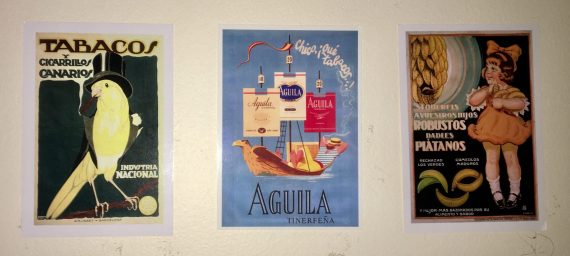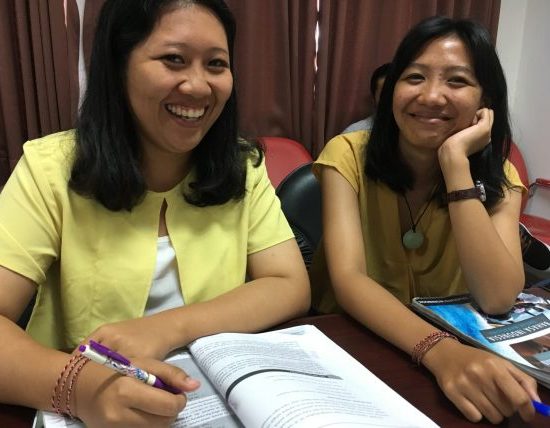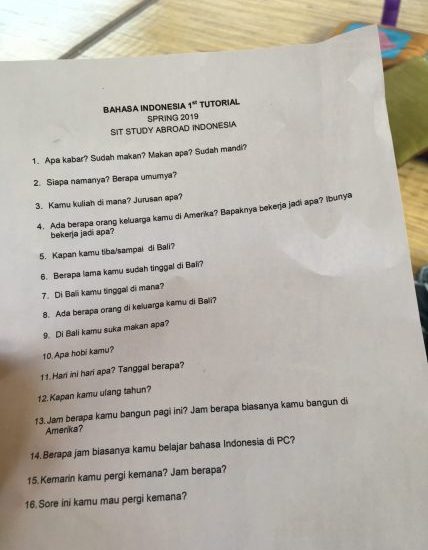
Week 3: Language
Around the globe there are around 7,000 languages spoken. They are representative of geography and culture and can be used to bring people together through stories that are passed down from generation to generation. Despite all of this, language can often be a barrier to the world outside of our homes. Even moving to a different part of the United States brings with it new terms and phrases that we can be unfamiliar with and it takes a while to get used to. This week, talk about your experiences with language. Does your study abroad location use a language different from the US? If not, what phrases or terms to fo you have to get used to. Do they use recognizable words that have different meanings? Any phrases or stories that you found particularly intriguing? Tell us about your experience with language, as you know the best way to learn a language is to immerse yourself in it!
Trey Spadone
Selamat pagi/sore/malam! (Good morning, afternoon, evening!)
Indonesia is one of the most ethnically and linguistically diverse nations in the world. With 17,000 islands, roughly 6,000 of which are inhabited, many languages have developed over the years.
I am currently studying and trying to speak Bahasa Indonesia which is the country’s official language. I became drawn to the language after learning about its role in facilitating trade between the various islands in the Archipelago. The people needed a common language and thus Bahasa Indonesia/Indonesian emerged.
I am having a blast learning Bahasa Indonesia and attempting to converse with my host families, teachers, and those around me. Speaking of teachers, my language teachers, Dian, Sani, and Yudi, are the absolute best. At the beginning of the semester we had class for five hours a day, but they made it engaging and exciting. They also entertain endless shenanigans and silliness.
During the first week, we had a “drop off” which involved the nineteen of us being individually dropped off around Kerambitan and instructed to interact with people. I ended up stumbling upon a place with a ping pong table and ended up playing table tennis for an hour with a couple guys from that village. We chatted about university, jobs, and our hobbies.
In addition to Bahasa Indonesia, there are about 300 ethnic languages spoken on the various islands. For example, in Bali many people speak Balinese and in Java many people speak Javanese. What makes Balinese and Javanese even more complicated is that both incorporate different “levels” of speech.
In Bali, the language reflects the Hindu caste system that exists on the island. The four castes from top to bottom are: Brahmana, Ksyatria, Wesya, and Sudra. There are three different politeness levels of Balinese speech. That means that a member of the Sudra caste would use the highest level when conversing with a member of the Brahmana caste, but would likely use the lowest level with other members of the Sudra caste. Javanese also has three different levels of speech which are used according to social status as well.
Emily Weaver
The Icelandic language is very different from English. It has a few different letters and the sounds that we are used to making in English are different in Icelandic. Due to all of this I was very concerned about heading into Iceland. I was worried that I would be totally lost in the country. Turns out, I had to no reason to be afraid. So many people in Iceland speak English. Children learn it in schools and so many of the working professionals have learned it that any store you go into, they’ll know how to speak English.
Even though we could get by without learning any Icelandic we took a few classes in order to learn some basics. SIT provided us with a language professor who happened to be in charge of the local music school in Ísafjörður. Our lessons were full of songs that she taught us and even some dance moves to go along with them.
Continuing on our musical trend, we also took some language lessons in Greenland. Greenland is an interesting place because everyone speaks the traditional Greenlandic language, but they also speak Danish because of the influence that Denmark had on the country for the longest time. Like Iceland though, most of the younger generation is also learning English, making them trilingual by the time they graduate high school!
We were incredibly lucky to have Nina Kreutzmann Jørgensen for our Greenlandic coach while we were there. Nina is a famous singer in Greenland and the arctic who is known for her work with several arctic music groups. She spent six hours with us, teaching us Greenlandic phrases, songs, and telling us old Greenlandic folk tales. Our lesson with Nina was incredibly fun, she even had us go stand outside to sing to nature at one point.
I had nothing to worry about when it came to language in these two countries. I could have gotten by only speaking English the entire time I was there, but instead our language lessons became some of my favorite classes that we had!
Renee Congdon
This is my favorite prompt so far!! I’m such a language nerd. I was in Madrid with a Colgate study group run by the Spanish department, and believe me when I say that I loved every freaking second of living in a Spanish-speaking environment. My all-time favorite thing was when I’d talk to someone new- a friend of a friend, or a neighbor, or someone at a coffee shop or on the metro or whatever- and after a while they’d ask me where I was from. When I answered the United States, I was almost always met with surprise. Some even said things along the lines of “no, no, but where are you from originally?”. When I confirmed that I was, in fact, originally from there, one of the most common responses was “But you speak Spanish so well!”. It both made me laugh and made me a bit sad that the world’s impression of Americans is that we can’t speak any language other than English. I always got a subtle ego boost from this- both because it was a compliment to my language skills and because it seemed to imply that I didn’t fit the mold of the stereotypical American. (The American stereotype, unsurprisingly, is not a flattering portrait.)
One thing I really enjoyed with respect to language in Madrid was learning regionalisms and dialectical differences. Some phrases are incredibly Spanish, and my Latin American friends would shake their heads and laugh at me when I used them. For example, “mazo”, “tío/a”, “joder” (that’s a bad word, but since it’s not in English I think it’s okay to leave it uncensored…), “guapo”, “mono”, and “majo”. Respectively, they mean “very/much/a lot”, “uncle/aunt” (but it’s used as an affectionate, joking nickname among friends), the f word, “attractive”, “adorable”, “snooty/preppy” and “cool” (used to talk about people). On the other hand, my Colombian friends loved to teach me their slang, which then confused my Spanish friends. For example, “chimba”, “vaina”, “parche”, y “parce”. Roughly translated, they mean “awesome”, “thing”, “hang out/kick back”, and “dude”. This little language game of peppering my speech with different slang words to get laughs out of different people or to fit in with different groups was very fun, and it helped me see the Spanish language through a more complex lens.
I’ll tell one more little (self-indulgent) story about my experience with speaking Spanish. During our very last night in Madrid, the whole study group along with our professors went to a nice restaurant to have a little goodbye dinner and reflect on the semester. The waiter went down the long table, asking us each for our order and chatting with us a bit, and when he finally got to me, I told him my order and clarified I was vegetarian, and he looked surprised and said “Oh! You’re Spanish?” I told him that no, I wasn’t, and he complimented my accent, saying he mistook me at first for a native speaker. I felt over the moon- and the fact that it was our very last night there felt very symbolic in some way. I left the restaurant, heading towards the metro with a big smile on my face, feeling half-Spanish and content.
The photo I’m attaching here is only kind of relevant. These are 3 retro postcards I got in Gran Canaria. They say, left to right: “Canary tobacco and cigarettes/national industry”, “boy, what tobacco!/ Tenerifean Eagle”, and “If you want your children to be robust, give them bananas/ Reject the green ones/ Eat them ripe/ The riper the better, for their nutrition and flavor”.




